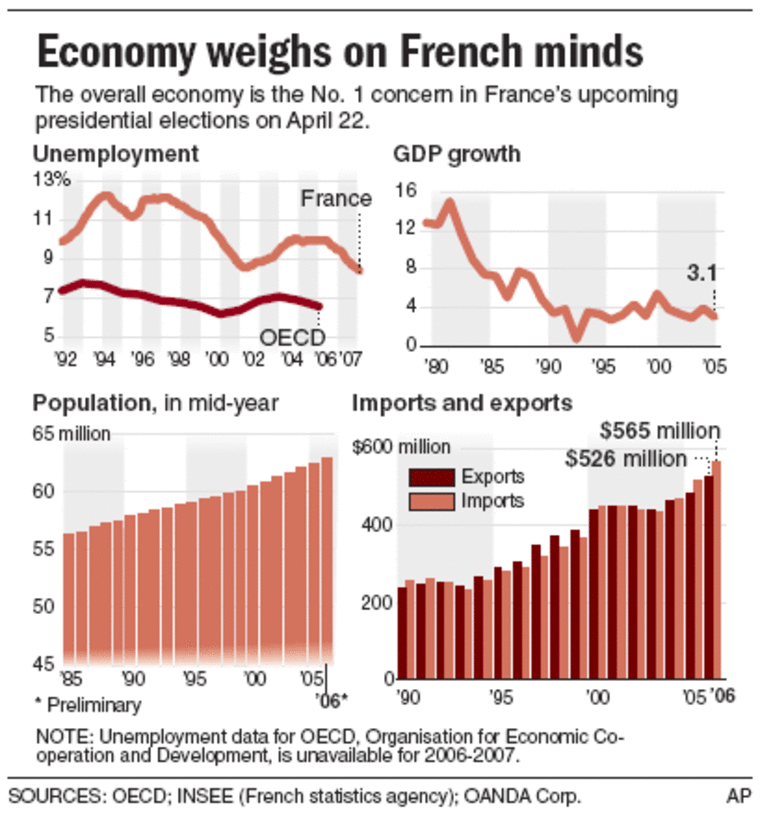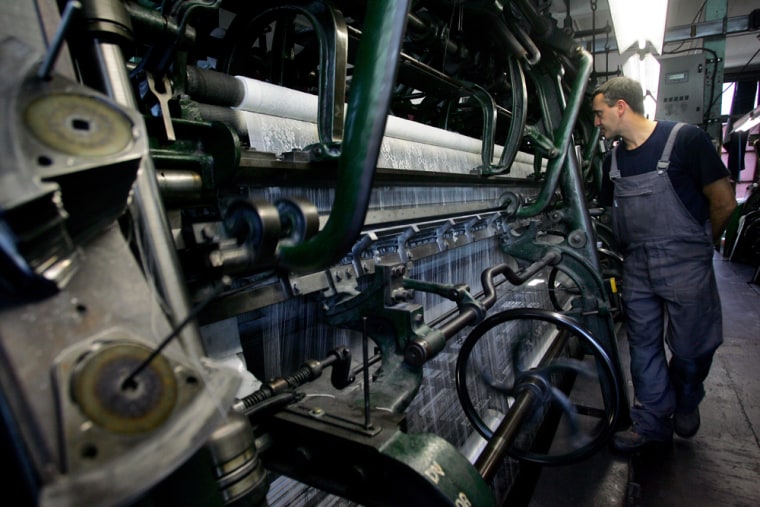Clusters of migrant workers mount the train’s crowded carriages, leaving their families and filing across the border to work at jobs more plentiful and lucrative than at home.
These hungry young men and women are not from lands riven by war or financial ruin, but from France — one of the world’s richest countries, and straining to stay that way.
Their knapsacks bear laptops or bottles of champagne, and their transport of choice is the Eurostar train, zipping them beneath the English Channel to London, a city radiating growth and opportunity.
The French workers are leaving an economy that is treading water while those of developing nations, and other wealthy ones, speed ahead. They’re fleeing a land once seen as a symbol of superior quality but that now even the French are convinced is in decline.
Half of French households live on less than $1,990 in income per month. Unemployment hasn’t fallen below 8 percent since 1984. Public debt has quintupled since 1980 to fund a welfare state that more people depend on for survival. Imports are spiking and fueling a ballooning trade deficit. France was among the top 10 richest countries per capita a generation ago — today’s it’s slipped to 17th place.
France is now on the cusp of change, choosing a new president who will be expected to yank the state-dependent economy out of its doldrums — but probably won’t. None of the candidates to replace conservative Jacques Chirac in the first round of elections April 22 appears to be a French Margaret Thatcher who would force profound and painful reform.
Front-runner Nicolas Sarkozy styles himself as an engine for major change. He would lower taxes and make the French work more, ideas welcomed by investors and the business community. Yet his pro-market credentials suffered when he suggested a state bailout of troubled planemaker Airbus, when he quashed foreign takeover bids while finance minister, and when he talked of “national champions” in industry.
Polling close behind is Socialist Segolene Royal, who climbed to fame by distancing herself from party policies such as the 35-hour workweek — then released a hard-left platform that would punish companies for moving jobs abroad and hike government spending.
Fresh ideas
Some of the freshest economic ideas are coming from Francois Bayrou, a champion of the average guy riding on disillusionment with the left-right paradigm. Bayrou, polling in third place, would allow businesses to hire two employees free of payroll taxes and social charges for the first five years — a shocking proposition here. But he would govern by consensus, a formula certain to bury bold reform.

Across the spectrum, jobs are question No. 1 for French voters mulling their presidential choices.
“I’d like to live in France. But I don’t want to work there,” said Nicolas Boutry, whose family lives on the French Riviera but who works for a London bank.
“In France you either search eternally for a job, or you stay eternally in a job,” he said.
Strict French labor laws are dubbed “worker-friendly,” yet millions can’t find work. Industries decamp to countries like China where hiring is cheaper and easier. Job seekers leave for countries like Britain with more job openings.
It would take major upheaval in France’s labor markets to draw people like Boutry home. A dramatic solution, too, is needed for the chronically unemployed and for the minorities in French housing projects, where riots broke out in 2005 and up to half of young people are unemployed.
A generation ago, debt-laden, strike-suffering Britain looked enviously at France, which boasted lavish worker protections and paid its state-run businesses to innovate.
History, however, favored free markets. Thatcher’s unpopular economic reforms in the 1980s left Britain better placed to benefit from fast-changing labor markets and accelerated capital movements.
“We should not be afraid today to be inspired by what works. The British model managed to create a society of full employment, peaceful and confident in the future,” wrote Pascal Boris of France’s BNP Paribas bank, who heads a group of French executives in Britain.
Suspicious of Britain
Instead, many French workers regard Britain with suspicion, equating its flexible job market with layoffs and insecurity.
Such suspicion thrives even within swimming distance of England’s shores, in the French port of Calais. Its residents are more dependent on state handouts than nearly other French city, and the surrounding region suffers France’s highest unemployment rate — 13 percent against a national rate of 8.6 percent.
Calais voters lean heavily left, and were among France’s staunchest opponents of the European constitution — a strangely isolationist stance for a town that’s been a continental crossroads for centuries.
Pubs and restaurants with English names line seaside streets, standing largely empty in winter, catering to English tourists in summer.
“My last job? The contract finished in 1996,” said Gerard Duquesne, a construction worker whose son and daughter-in-law, too, are out of work.
On the London end of the Eurostar’s trajectory, pubs throng with consultants, business students and entrepreneurs from around the globe.
At an airy pub in the affluent South Kensington district, a clutch of French expats bantered in a strangely fluent mix of French and English.
“In France, most young people want to become civil servants. Can you imagine?” asked Boutry, 32.
More than half of the wealth France produces comes from the public sector, according to government statistics. French people receive nearly as much income from the state as from the private sector.
Such figures raise few eyebrows in France, where leftist ideology retains a powerful hold over public opinion, and politics and economics are closely intertwined. They’re shocking, however, to people worried about France’s public debt, which has soared in recent years to 66 percent of GDP.
The presidential candidates’ platforms suggest change is inevitable, but it’s likely to be slow. Boris says that would doom France to further decline, as nations around the world bound ahead.
Boris and Boutry are among some 2.2 million French people believed to be living abroad today — half of whom are under 35, and half of whom don’t plan to return to France until retirement. This globalized electorate is attracting candidates’ attention, in a campaign where France’s shrinking role in the world economy is among voters’ greatest preoccupations.
‘France’s paradox’
When the Eurostar returns to Paris’ Gare du Nord train station, it disgorges not only tourists and French workers returning from London jobs — but also international executives coming for negotiations with French multinationals. These companies have managed to stay competitive by harnessing the energies of globalization while the rest of the country lags behind.
“This is part of France’s paradox, and its dilemma,” said economist Daniel Cohen.
Demographers say the French are closet optimists. Last year, the French were the EU’s baby-making champions, largely thanks to government policies that pay parents to multiply. That’s welcome news for an overburdened pension system girding for a costly boom in retirements.
Meanwhile, a recent poll asked Britons, with their booming economy, where they’d most like to live. Their answer? France.
